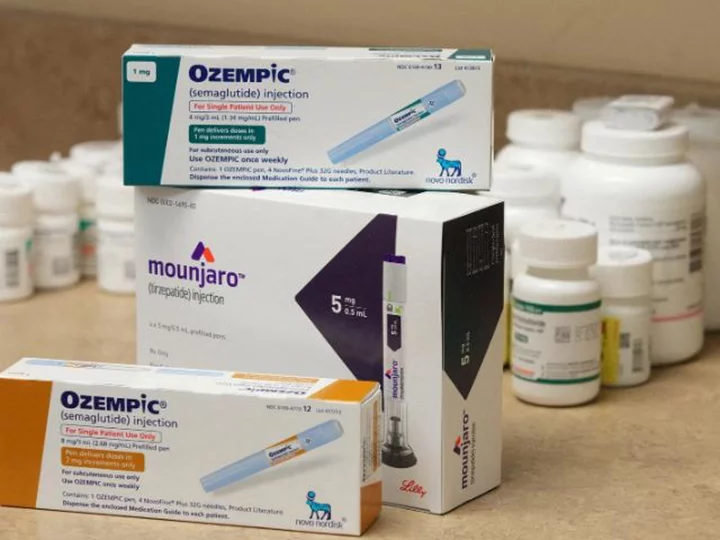Ozempic, originally a medication for treating diabetes, is in high demand worldwide with celebrities and social media users touting it as a miracle drug for weight loss. Now the frenzy is sweeping through China, where being "wafer thin" is a prevailing beauty standard, leading to shortages in the country.
Chinese social media apps, such as Douyin and Xiaohongshu, have been flooded by posts from users bragging about how they've easily lost 10 or more pounds within a month with just a few injections of Ozempic, which is the brand name of semaglutide.
"This is a wonder drug," according to a popular series of posts on Xiaohongshu, a Chinese social app similar to Instagram. "No diet, no exercise, you can reduce weight even when you are lying still."
Ozempic was officially approved in China in April 2021 for treatment of type 2 diabetes. But users can get it from doctors for other uses, or buy it on e-commerce platforms such as Taobao and JD.com with other people's prescriptions.
Medical experts say the drug can have serious side effects. Studies and patient reports show that many patient see their weight rebound soon after stopping the injection.
But its soaring popularity in China means many hospitals and drugstores have run out of Ozempic since late last year, according to the state-owned People's Daily Health.
That has caused problems for patients with diabetes who depend on the medication.
A doctor at the First Affiliated Hospital of Sun Yat-sen University in the megacity of Guangzhou told official media last month that the hospital briefly ran out of Ozempic because of surging demand from patients seeking to lose weight. The hospital has since stopped prescribing it to people who don't have diabetes.
Soaring prices
The social media hype was so enormous that Xiaohongshu launched a crackdown in February and deleted more than 5,000 posts sharing weight loss experiences with Ozempic.
The social media platform accused many posts of "exaggerating" the drug's effectiveness as a weight loss aide and warned its users not to "blindly believe" in such content.
The platform also initiated a pop-up alert reminding users searching for the drug online to "go to formal medical facilities for treatment."
But it wasn't enough to calm the frenzy. People in China, particularly women, have long faced pressure to conform to beauty standards that emphasize an extremely slim figure.
With rising demand, prices have soared online. The official cost of a 1.5 mg Ozempic dose is 478 yuan ($67) in public hospitals, according to China's National Reimbursement Drugs List.
But prices for the same medication currently range from 36% to 151% higher on online shopping site Taobao.
According to its manufacturer, Danish pharmaceutical firm Novo Nordisk, Ozempic recorded sales of 303 million Danish kroner ($44 million) in China in the nine months after it launched in April 2021.
The next year, sales in the country soared more than sevenfold, hitting 2.2 billion Danish kroner ($316 million.)
Fill the shortage
The weight loss drug market in China is expected to boom in the coming years.
A government report from late 2020 said more than 50% of adults in China were overweight, which is defined as having a body mass index (BMI) of more than 24.0.
Total sales of GLP-1 drugs, a class of diabetes medication that includes semaglutide, could reach a peak of 40 billion yuan ($5.6 billion) in China, according to an estimate by Shanghai-based Tebon Securities last October. It did not provide a timeframe.
That would represent a more than 600% increase from the current market size.
Both Western and Chinese drugmakers want a slice of the growing market.
Novo Nordisk has applied to China's drug regulator to widen the scope of use for semaglutide, according to the National Medical Products Administration. Its website showed the regulator received the application on Saturday.
State media speculated that the application would be for weight loss. The drugmaker hasn't responded to a CNN request for comment.
Several Chinese firms have accelerated their development of generic versions of semaglutide.
Novo Nordisk's patents for semaglutide in China are expected to expire in 2026, which is the earliest that generics could be available for sale.
But this is being challenged.
In June 2021, Huadong Medicine, a pharmaceutical firm based in Hangzhou, applied to China's State Intellectual Property Office to invalidate the patent. In September 2022, the office ruled all so-called core patents for Ozempic to be invalid in China.
Novo Nordisk has appealed the decision. A legal battle is currently underway at the Beijing Intellectual Property Court. If the decision is upheld by the court, a raft of generic versions of semaglutide by domestic manufacturers could come into the market.









